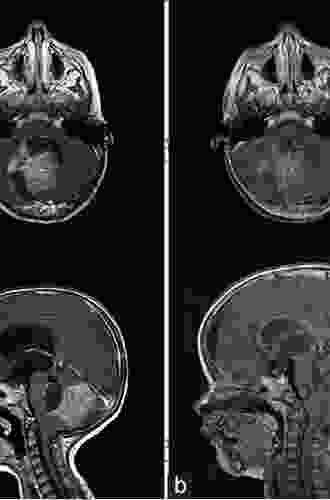Posterior Fossa Tumors in Children: A Comprehensive Guide for Parents and Caregivers

What are Posterior Fossa Tumors?
Posterior fossa tumors are abnormal growths of cells that develop in the back of the skull, known as the posterior fossa. This region of the brain houses vital structures such as the cerebellum, brainstem, and cranial nerves. Posterior fossa tumors are the most common type of brain tumor among children, accounting for approximately 40% of pediatric central nervous system tumors.
Types of Posterior Fossa Tumors
There are various types of posterior fossa tumors, classified based on their location and cell lineage. The most common types include:
5 out of 5
| Language | : | English |
| File size | : | 56562 KB |
| Text-to-Speech | : | Enabled |
| Screen Reader | : | Supported |
| Enhanced typesetting | : | Enabled |
| Print length | : | 1884 pages |
| Hardcover | : | 98 pages |
| Item Weight | : | 11.2 ounces |
| Dimensions | : | 6.14 x 0.25 x 9.21 inches |
* Medulloblastoma: Arises from primitive cells in the cerebellum. * Ependymoma: Originates from the cells lining the ventricles of the brain. * Astrocytoma: Stems from star-shaped cells called astrocytes. * PNET (Primitive Neuroectodermal Tumor): A rare and aggressive tumor that arises from undifferentiated cells.
Symptoms of Posterior Fossa Tumors
The symptoms of posterior fossa tumors can vary depending on the tumor size, location, and rate of growth. Common symptoms include:
* Headaches, especially worse at night or upon awakening * Nausea and vomiting * Unsteady gait and balance problems * Double vision or blurred vision * Facial weakness or numbness * Headache accompanied by fever, seizures, or loss of consciousness
Diagnosis of Posterior Fossa Tumors
Early diagnosis of posterior fossa tumors is crucial for optimal treatment outcomes. The diagnostic process typically involves:
* Physical and neurological examination: To assess coordination, balance, and cranial nerve function. * Imaging tests: Magnetic resonance imaging (MRI) and computed tomography (CT) scans provide detailed images of the brain and tumor. * Biopsy: A small tissue sample is taken from the tumor for analysis to confirm the diagnosis and determine the tumor type.
Treatment Options for Posterior Fossa Tumors
The treatment plan for posterior fossa tumors depends on several factors, including the type, location, and stage of the tumor. The primary treatment modalities include:
* Surgery: The first line of treatment for most posterior fossa tumors is surgical removal. The aim is to remove as much of the tumor as possible while preserving surrounding healthy tissue. * Radiation therapy: High-energy X-rays or protons are used to shrink the tumor and prevent recurrence. Radiation therapy may be given before or after surgery. * Chemotherapy: Medication used to kill or slow the growth of cancer cells. It can be given orally or intravenously. * Targeted therapy: Drugs that interfere with specific molecules or pathways involved in tumor growth.
Prognosis and Outlook
The prognosis for posterior fossa tumors depends on various factors, including the tumor type, stage, and response to treatment. With advances in surgery, radiation therapy, and chemotherapy, the overall survival rates have improved significantly.
* For medulloblastoma, the most common type of posterior fossa tumor, the 5-year survival rate is approximately 75-80%. * For ependymoma, the survival rate varies depending on the grade and location of the tumor. * Astrocytomas have a more favorable prognosis compared to other types of posterior fossa tumors. * PNETs are rare and highly aggressive, with a relatively low survival rate.
Long-Term Effects of Treatment
Treatment for posterior fossa tumors may have long-term effects on the child's neurodevelopment and overall well-being. Potential late effects include:
* Cognitive impairment * Behavioral changes * Endocrine imbalances * Hearing loss * Visual impairment
Regular follow-up and rehabilitation programs are essential to address these long-term effects and ensure the child's optimal recovery and quality of life.
Support for Families
A diagnosis of a posterior fossa tumor can be an overwhelming experience for families. Support from loved ones, medical professionals, and support groups is crucial during this challenging time.
* Support groups: Connecting with other families who have children with posterior fossa tumors can provide emotional support and valuable information. * Medical professionals: The child's neurologist, neurosurgeon, and oncologist will provide ongoing medical care and guidance. * Family support services: Social workers and child life specialists can offer practical and emotional support to families throughout the treatment and recovery process.
Posterior fossa tumors are a common type of brain tumor in children. Early detection and comprehensive treatment, including surgery, radiation therapy, and chemotherapy, play a vital role in improving the child's prognosis and long-term outcomes. Families affected by this diagnosis should seek support from loved ones, medical professionals, and support groups to navigate the challenges and ensure their child's well-being.
5 out of 5
| Language | : | English |
| File size | : | 56562 KB |
| Text-to-Speech | : | Enabled |
| Screen Reader | : | Supported |
| Enhanced typesetting | : | Enabled |
| Print length | : | 1884 pages |
| Hardcover | : | 98 pages |
| Item Weight | : | 11.2 ounces |
| Dimensions | : | 6.14 x 0.25 x 9.21 inches |
Do you want to contribute by writing guest posts on this blog?
Please contact us and send us a resume of previous articles that you have written.
 Book
Book Novel
Novel Page
Page Text
Text Story
Story Genre
Genre Reader
Reader Paperback
Paperback E-book
E-book Newspaper
Newspaper Sentence
Sentence Shelf
Shelf Glossary
Glossary Foreword
Foreword Synopsis
Synopsis Annotation
Annotation Manuscript
Manuscript Scroll
Scroll Codex
Codex Library card
Library card Reference
Reference Encyclopedia
Encyclopedia Dictionary
Dictionary Thesaurus
Thesaurus Narrator
Narrator Librarian
Librarian Catalog
Catalog Stacks
Stacks Research
Research Reserve
Reserve Academic
Academic Journals
Journals Rare Books
Rare Books Special Collections
Special Collections Study Group
Study Group Thesis
Thesis Dissertation
Dissertation Awards
Awards Reading List
Reading List Textbooks
Textbooks Roxanne Willems Snopek
Roxanne Willems Snopek Marilynn Ham
Marilynn Ham Jane Heaton
Jane Heaton Iona Grey
Iona Grey Ron Tucker
Ron Tucker John Keegan
John Keegan Kathe Hicks Albrecht
Kathe Hicks Albrecht Debra Jason
Debra Jason Diane Eichenbaum
Diane Eichenbaum Jason Romano
Jason Romano Dalivia Plaut
Dalivia Plaut Ivan Jablonka
Ivan Jablonka Robert F Berkhofer
Robert F Berkhofer Robert Chandler
Robert Chandler Charles R Swindoll
Charles R Swindoll Lisa Goodson
Lisa Goodson Tim Langdell
Tim Langdell Hannah Lillith Assadi
Hannah Lillith Assadi Ginny Hogan
Ginny Hogan Jennifer Calvert
Jennifer Calvert
Light bulbAdvertise smarter! Our strategic ad space ensures maximum exposure. Reserve your spot today!

 Edwin BlairUnveiling the Hidden History of the New Hampshire Seacoast: A Journey Through...
Edwin BlairUnveiling the Hidden History of the New Hampshire Seacoast: A Journey Through...
 Abe MitchellLucaci Florentin: Magic Poetry Grandmaster - Immer Fur Sie Da (Always There...
Abe MitchellLucaci Florentin: Magic Poetry Grandmaster - Immer Fur Sie Da (Always There... Luke BlairFollow ·16.6k
Luke BlairFollow ·16.6k Allen GinsbergFollow ·16.4k
Allen GinsbergFollow ·16.4k Shannon SimmonsFollow ·19.5k
Shannon SimmonsFollow ·19.5k Timothy WardFollow ·19.2k
Timothy WardFollow ·19.2k Ibrahim BlairFollow ·17.9k
Ibrahim BlairFollow ·17.9k Frank ButlerFollow ·17.4k
Frank ButlerFollow ·17.4k Cole PowellFollow ·3.5k
Cole PowellFollow ·3.5k Vernon BlairFollow ·19.1k
Vernon BlairFollow ·19.1k

 F. Scott Fitzgerald
F. Scott FitzgeraldRobot Buddies: Search For Snowbot
In the realm of...

 Mario Vargas Llosa
Mario Vargas LlosaUnlocking Academic Success: A Comprehensive Guide to...
In the ever-challenging academic...

 Gabriel Blair
Gabriel BlairMake $000 Per Month Selling Your YouTube Freelancing...
Are you looking for a...
5 out of 5
| Language | : | English |
| File size | : | 56562 KB |
| Text-to-Speech | : | Enabled |
| Screen Reader | : | Supported |
| Enhanced typesetting | : | Enabled |
| Print length | : | 1884 pages |
| Hardcover | : | 98 pages |
| Item Weight | : | 11.2 ounces |
| Dimensions | : | 6.14 x 0.25 x 9.21 inches |














